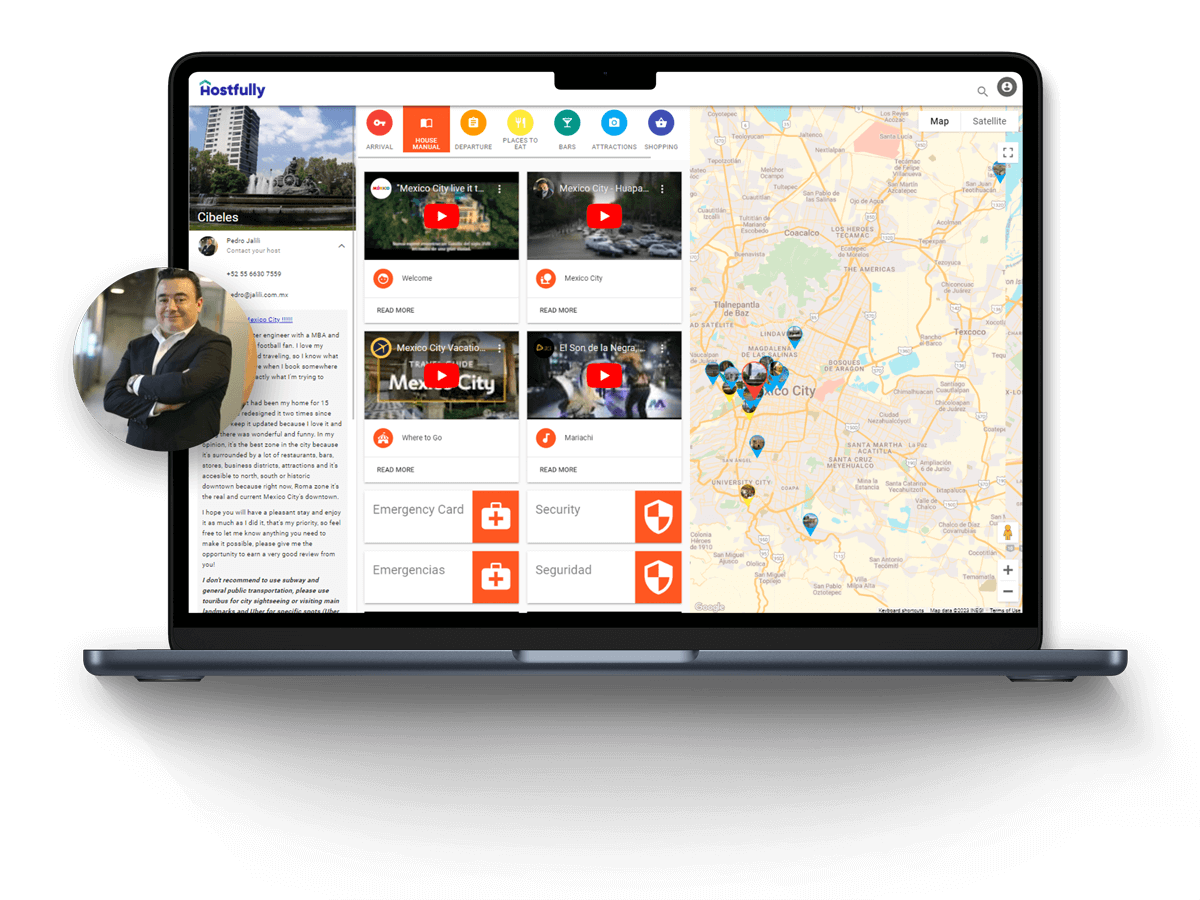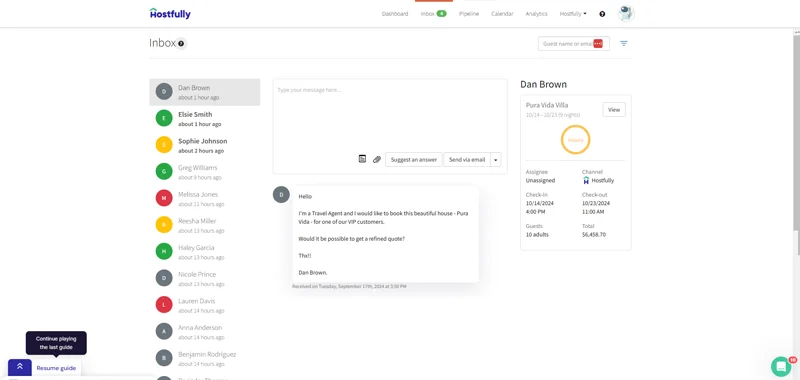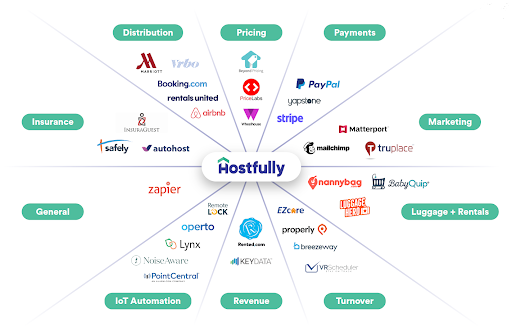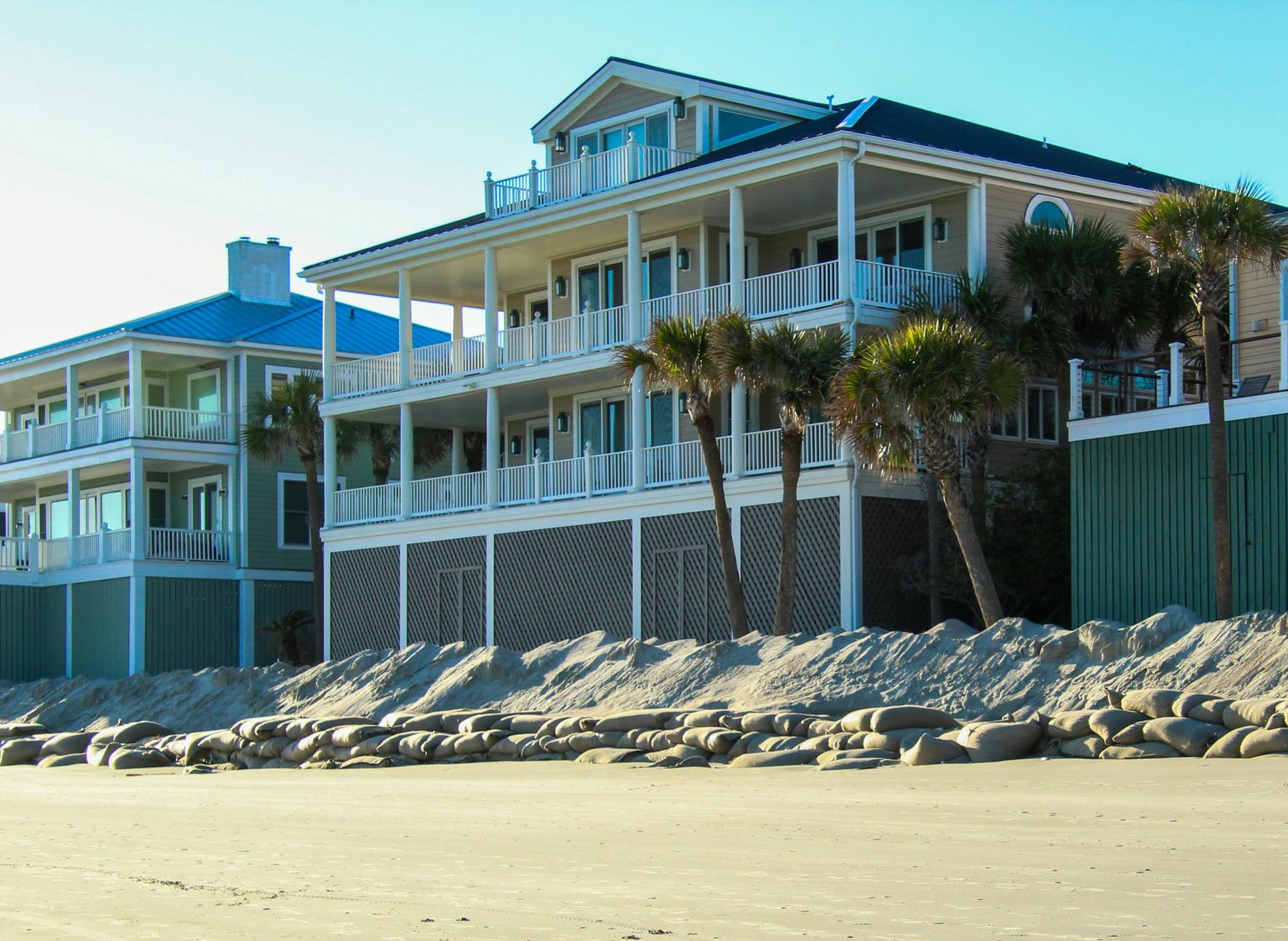Whether you started out in real estate or you’re new to property management altogether, listing on Airbnb can feel overwhelming. It is one of the most popular platforms for holiday accommodation, meaning the competition is tough, and ensuring your new listing is visible to potential guests can be difficult.
The challenge is creating a standout experience while keeping the process cost-effective and manageable. Even if your property is head and shoulders above the competition, it can still be hard to match the visibility of long-term users and Superhosts who have curated a long list of satisfied reviewers over the months and years.
In this guide, we’ll walk you through setting up your business to help you start earning and build a strong review base from day one. We will look at the essential steps for preparing your vacation rental, listing on Airbnb, and setting yourself up to become an Airbnb Superhost.
Along the way, we’ll include some tips and insights from veteran Airbnb user Sebastien Long the CEO and Founder of Lodgeur, a successful STR company based in Texas.
Essential steps before you list on Airbnb
Making sure hospitality is the right fit and understanding how Airbnb works can give you a head start. You can’t afford to learn on the job. Great reviews early on are vital to helping you build a strong reputation while low ratings can sometimes mean an uphill battle to increase your property’s visibility on the platform.
Consider whether your property makes a good Airbnb
The first step is to decide whether starting an Airbnb business out of one of your properties would be viable. Fortunately, Airbnb attracts a broad range of guests from across the world so you’re unlikely to find this an issue.
Also, determine what kind of Airbnb business would be a success in your area. You may have some ideas but you may find aspects of your property and the local area are unsuitable for certain types of guests. For example, houses with lots of stairs and limited space might not be the ideal Airbnb for families with young children no matter how well you market your business.
If none of your current portfolio seems like a good option and you don’t want to invest in anything new, consider different ways you could become an Airbnb host without owning property.
Research local short-term rental requirements
If you have rented out properties before, you’re likely familiar with some of the challenges that come with meeting local requirements. However, short-term rental management operates in a slightly different landscape.
As short-term rentals have gained in popularity, many local governments have introduced regulations to ensure housing availability, tax compliance, and safety standards. Many require you to obtain a short-term rental license, undergo various inspections, and meet strict occupancy limits before you Airbnb your house.
More recently, governments have started setting laws and guidelines for platforms like Airbnb as well as short-term rental operators. This means Airbnb often collaborates with local authorities to ensure hosts comply with the regulations. They might require you to upload certain documents before you join and share information about your business.
Brush up on Airbnb’s rules
Don’t forget about Airbnb’s own requirements. Since the start, the platform has set rules and guidelines to ensure a smooth booking process for hosts and guests. These include identity verification, restrictions on parties, and anti-discrimination policies.
Airbnb lays out all its rules in its Responsible Hosting help pages. It has one per country and updates these regularly to reflect new laws and guest expectations.
But there aren’t just rules for hosts. Airbnb has requirements for guests to ensure they treat every property and host with the respect they deserve. Researching these rules can help you understand your rights and how Airbnb can support you if you have a bad experience.
Take neighbors into account
Before getting started, consider your Airbnb’s impact on your neighbors and their potential reactions. A constant flow of guests can lead to issues, especially in quiet or residential areas.
If you’re in an area with a Homeowner’s Association, you may even need to ask permission or meet some rules before you can accept guests.
Talking to neighbors in advance can give them advanced warning and help you proactively address some of their concerns. For example, they might be worried about Airbnb guests using up all the parking spots. You can get ahead of this problem by including instructions and directions for nearby acceptable spots for guests and leaving your contact details for neighbors.
Be aware that Airbnb takes complaints from neighbors seriously. If too many people flag issues with your business, it may result in some or all of your properties being delisted.
Get a second opinion on your Airbnb property
Ask others to evaluate your property and your business plan. Friends and families don’t need to be experienced short-term rental operators to do a quick tour and tell you what they think. They may notice potential issues or opportunities that you’ve overlooked.
For example, if you plan to host business travelers, consider asking colleagues or friends who move around frequently for work what features they value in a rental. They might point out that your WiFi is too slow or there aren’t enough suitable places to take quiet phone calls. With their feedback, you have a chance to improve your Airbnb before you set up an account and your listings go live.
Consider resources and support
Think ahead about which tools and resources you’ll need to ensure a smooth start to your Airbnb business and sustain momentum. Here’s a quick look at what you could invest in before you start:
- A cleaning and maintenance crew to keep your property up to standard
- An accountant to handle bookkeeping and tax returns
- A professional photographer to get the best possible shots of your property
- Smart locks and devices to keep your property secure without inconveniencing guests
- A property management system (PMS) to automate guest communications, check-in, and turnover
- A digital guidebook to inform guests about your property and the local area
- A channel manager to sync your Airbnb account with your other listings
- Dynamic pricing tools to set the optimal rates automatically

Getting your property Airbnb-ready
Once you’ve confirmed that Airbnb is the right choice for you, it’s time to start preparing your property to receive guests. This guarantees that you can deliver the best possible guest experience from the first stay and get those 5-star reviews.
Apply for your short-term rental license in advance
Some jurisdictions require a license to demonstrate that your business meets all its tax and zoning requirements. Airbnb collaborates with local authorities by asking you to upload this document before it approves your listing.
Apply as soon as you know you want to open an Airbnb business to avoid delays. The filing process should only take from a few days to a couple of weeks but there’s always a chance of complications. Getting your permit as far in advance as possible means you’ll have the documentation ready to go when you make your Airbnb account.
Decide how to manage cleaning and turnover
Dirty or poorly kept properties are one of the main things mentioned in negative Airbnb reviews. The platform also mentions maintaining high standards in its rules and guidelines.
But you can’t just give your rental a deep clean before the first guests arrive — you need to have a sustainable system for keeping everything sparkling without affecting turnover times.
Hire a professional service if you don’t think you can keep up with the tasks around your other responsibilities. Many companies cater exclusively to Airbnbs and other vacation rental businesses.
Property management systems (PMS) like Hostfully can help you stay on top of cleaning remotely. The systems task management feature lets you set schedules, automatically notify cleaners of new tasks, and track the process of turnovers. Hostfully also shares data with our other tools such as the booking calendar and guest communication so you don’t have to waste time checking and updating your staff.
Ensure you can meet Airbnb requirements
Figure out how to meet Airbnb’s requirements without inconveniencing and off-putting guests. Long says guests aren’t very forgiving of issues. “Hosts must be diligent and communicate any rules and requirements they have in advance, such as the rental agreement and house rules.”
Sending guests an email with details like your cancellation policy and house rules can help you deliver some of this information. You can explain the city’s quiet hours or occupancy limits in case, for example, they’re thinking of hosting a spur-of-the-moment party. A PMS like Hostfully let you create a template for messages like this so you can schedule the message at a specific point in the guest journey, giving you less work to do and making it impossible for you to forget.

Check all health and safety standards are met
Airbnb has strict health and safety standards. Give yourself plenty of time to make sure your rental property meets these including booking inspections, professional services, and replacing or upgrading devices.
Specifically, focus on:
- Checking devices like smoke alarms and fire extinguishers work
- Clearing all possible obstacles to fire exits
- Obtaining the right certification from the gas company or fire department
- Eliminating any mold, pests, or vermin
- Investigating potential risks to the property like nearby overhanging trees or running water
Showcase your efforts on your Airbnb profile and somewhere on the property. By demonstrating your commitment to safety, you’ll build trust with guests and make them want to come again and again.
Decide on your unique selling point
Airbnb has 7.7 million listings meaning you have to work hard to stand out among the competition. Working out what makes your business special can help you differentiate yourself quickly from similar businesses in the area.
The best starting point is identifying your target audience and exploring how your business caters to their needs. Perhaps you primarily host digital nomads. You can then see what you can offer to guests that other Airbnbs can’t.
Your unique selling point might be something quite simple. For instance, once you’ve covered the basics like fast WiFi and quiet spaces, you might notice you’re the only Airbnb for several miles that has electrical outlets on your balcony for working outside. You can play up these features in your listing and marketing.
Creating your Airbnb listing
Getting set up on Airbnb is relatively straightforward but there are some tips and tricks that can make the process go smoother.
1. Create an account
Go to the Airbnb website and click on “Sign Up.” You can join using any of the following:
- Phone number
- Email address
- Apple
If you already have accounts with similar platforms, we recommend using the same credentials for simplicity and to share data more easily.
Airbnb will ask you to verify your phone number or email address. This should only take a few minutes.
Once inside Airbnb, you can start setting up your profile. Add your profile picture and complete your profile with basic information, such as your name and a short bio.
2. Verify your identity
Airbnb will ask you to prove it’s really you before allowing you to go any further. The exact next steps depend on your country and the local requirements.
Most hosts need to provide their legal name, address, and a few pieces of personal information. Sometimes you may be asked to supply a copy of your government ID or take a selfie with your device. A few countries use facial recognition technology to verify your identity.
Airbnb aims to approve these details and documents within one hour of you uploading them to the system.
3. Add payment information
Decide how you’d like to get paid by guests. The available payment methods vary across locations but generally, Airbnb lets you decide between:
- Debit or credit card
- Apple Pay
- Google Pay
- PayPal
Airbnb allows US and Canadian businesses to accept Klarna payments, which enables your guests to pay in installments rather than one lump sum.
4. Create a listing
Click on “Host” in your dashboard and select “Create a new listing.” Now Airbnb will ask you the following series of questions about your short-term rental business:
- The property type (for example, house, apartment, castle…)
- Whether you’re renting out the whole property or just a portion of it
- Whether you want to make your exact location visible
- How many guests you can host at one time
- How many beds, bedrooms, and bathrooms you have
- What amenities you offer (for instance, WiFi, hot tub…)
- Whether you offer the mandatory safety items
Be as honest as possible. If you choose options to make your property sound better, guests are likely to feel disappointed when they turn up and give you negative reviews.
5. Upload high-quality photos
Upload at least five high-quality photos of resolution 1024 x 683 pixels of your property to your account, preferably even more. This is the first thing potential guests see when browsing properties so you need to make it count.
The standard approach is to pick a wide-shot image of your property from the outside as your cover photo to give your guests the best impression of what it’s like. Ideally, arrange this in the daytime when there’s plenty of good, natural light. Then there should be at least one photo of all the other rooms or spaces in the property.
Additionally, think about the surrounding area. If your property has a stunning view, make sure to feature it in your photos. Or if you’re a few metres from a popular tourist attraction, take a photo that demonstrates just how close they’ll be.
6. Write a compelling title clear property title and description
Write a title using 32 characters or fewer including spaces. Instead of using flowery language, take this opportunity to showcase your property’s top features or amenities.
For example:
❌ “Chic French-style villa in the countryside”
✔️ “Rural villa just 10 miles from Mont St Michel”
✔️ “Country villa with tennis pitch and hot tub”
If you’re already set up with a channel manager like Hostfully, you can just transfer across all your images from your other listings. You just need to integrate your system with Airbnb.
7. Write a truthful yet inviting property description
Next, Airbnb asks you to pick some highlights from a list – just try to choose the ones you think best represent your property.
Now write a property description in 500 characters or fewer including spaces. Be honest and accurate to give your guests an accurate idea of what to expect and set yourself up for success. You can think about your target guests here and what they’ll like most about your property, for example, fast WiFi for business travelers or large yards for pet owners.
8. Set your pricing
Decide what occupancy rates per night to charge. Airbnb suggests an amount based on your property type and amenities but it’s not exact. It’s best to do some research to ensure you find the right balance to remain competitive while turning a profit.
Airbnb also asks if you’d like to set any discounts as a new listing or for guests who book for the entire week or month. This decision rests on your specific business structure. Project your earnings and see whether you’re likely to generate more revenue with or without the offers.
Additionally, set your nightly rate with Airbnb’s transparent pricing in mind. All extra fees for cleaning and special services are included upfront in the search results for your listing.
9. Disclose possible issues
In the final step, Airbnb asks whether you have exterior cameras and a noise-decibel monitor. Answer honestly as transparency is the best way to win over guests.
Airbnb also checks whether you keep weapons on the property. Rather than responding ‘yes’, we recommend you remove anything that could be considered weaponry from your property for guest safety and comfort.
10. Upload your short-term rental permit
In some regions, you must upload your rental license or registration number to Airbnb to comply with local regulations. You can do this easily in the “Listing” section of your host dashboard.
Failing to do so before you publish your listing may result in penalties or legal action. What’s more, Airbnb may remove your listing from the platform and ban you and your local authorities might temporarily revoke your license.
11. Publish your listing
Once everything is set, review your listing to check everything is correct and click “Publish.” Your property will now be live on Airbnb for potential guests to view and book. However, it might take a few days to appear in the algorithm and become fully visible to potential guests.
12. Manage booking request
But just in case, start checking Airbnb as soon as your listing goes live for booking requests. You need to respond promptly to inquiries and confirm reservations to make a good impression — and those first reviews are vital to success.
How to get more bookings and keep your calendar full
Even the best hosting businesses get lulls, which leave gaps in their calendar and reduce their earning potential. For example, Lodgeur may be a successful company, having hosted over 10,000 guests, but Long says it still took 3 years before he could draw a paycheck from his business.
But that doesn’t mean new Airbnb owners are powerless. There are plenty of strategies you can use to fill those empty days, maximize your profits, and become profitable faster. Here’s what the most successful Airbnb owners are doing:
Respond quickly to inquiries
Every guest that sends an inquiry is a potential booking. But most guests on Airbnb won’t wait around forever, and with so many available properties, they will most likely book something else if their inquiry is not answered promptly.
As Long says, “Airbnb is a 24/7 business because guests expect near-instant responses. They treat the app like instant messaging, expecting hosts to respond fast.”
The challenge isn’t replying fast enough. You might not have the information to hand nor the time to go sifting through your inbox, calendar, and schedules.
Use an AI inbox to answer quickly and secure the reservation. Tools like Hostfully automatically search your PMS data to find the answers and draft the perfect messages for guests. They’re less likely to stop looking elsewhere and they may be impressed with the speed and precision of your answer.
Encourage guests to leave reviews
Your reviews play a key role in your listing’s success. Airbnb rentals with an average rating under four stars may get fewer views as users filter searches to four stars or higher, which could lead to reduced visibility.
Prompt guests to leave a review after they leave in a quick email. Hostfully PMS lets you create a template and schedule it for a few days after they’ve left while the experience is still fresh in their mind. The tool lets you add triggers and conditions so you can fill in their details, ensuring you maintain a personal touch.
Don’t forget to leave guests an Airbnb review too. Your kind words may also encourage them to leave you a high rating with some praise on the platform.
Check our article on Airbnb host review templates for inspiration.
Take advantage of social media
Posting your property on social media helps you reach a wider audience. You can add a link to your Airbnb page on most platforms so guests can easily find you once you’ve caught their attention.
Try using a combination of self-made content and community engagement to achieve the broadest reach. You can post special promotions through social media, such as off-season discounts or codes, to encourage users to like or comment on your account. But you can also encourage guests to tag your business in their own posts so their followers know where to find you if they like the look of the photos.
Adopt a flexible approach to pricing
Use a dynamic pricing tool to automatically adjust your rates based on your occupancy levels, historic patterns, and competitor prices. This lets you find the optimal price to drive bookings at any time of year, whether you’re experiencing a lull or a massive spike in reservations.
Tools like PriceLabs and Beyond sync with your other tools to collect the relevant data and apply it consistently across your listings. For example, they can see from your booking calendar on Hostfully that your prices are higher than nearby businesses and drop the rate on Airbnb, your website, and anywhere you list your property online.
Never limit yourself to Airbnb
Advertise your rental on a direct booking site and other listing platforms to get the widest reach. You can still make Airbnb the center of your operations but you can benefit from diversifying your revenue a little.
If you decide to branch, just make sure you use a channel manager like Hostfully to sync your booking across different sites. You can ensure your information and prices remain the same no matter where guests look. This helps you avoid situations where people make a reservation before realizing you offer lower rates elsewhere, leaving them feeling frustrated at your business.

Another thing to bear in mind is that you can’t count on Airbnb for everything. Long says that many first-time hosts think it’s easy income. “They don’t screen their guests assuming Airbnb does it. They don’t have proper insurance in place, again assuming Airbnb covers them. And they don’t check the regulations or pay local taxes.”
Long reminds us that responsibility ultimately comes down to the host. “Hospitality is a profession, not a hobby.”
Want more ideas to boost your revenue? Read our article on how to get more bookings for your Airbnb.
Reaching the level of Airbnb Superhost
If you consistently deliver exceptional service, you get awarded with Airbnb Superhost status. The benefits make this very worthwhile, with increased visibility and a badge on your listing.
To achieve Airbnb Superhost status, you must meet certain criteria:
- A consistent 4.8 rating or higher
- 10 bookings within 100 nights
- A 90% response rate within 24 hours
- Cancellations under 1%
Maintaining these conditions can be challenging for first-time Airbnb hosts. You can only achieve the first two after you’ve spent a considerable amount of time on the platform and you must have only positive reviews.
But it’s a worthwhile goal to bear in mind as you get started. Once you hit Airbnb Superhost status, attracting guests and filling your booking calendar becomes much easier.
Make your first listings on Airbnb count with Hostfully PMS
Your first weeks on Airbnb determine a lot of your future success. While it’s possible to come back from bad reviews or suboptimal listings, it’s an uphill battle.
Preparation is key here. Before you list your property on the platform, make sure you have everything ready to go from the rental and the paperwork to your pricing strategy. You’ll find it much easier to stay on top of bookings and get those first precious five-star ratings.
But don’t feel like you need to do this alone. Get professional support where possible and automate key elements of the process with Hostfully PMS to improve overall accuracy and efficiency.
Frequently Asked Questions About Airbnb Hosting
How much do Airbnb hosts get paid?
A recent report found that the average Airbnb host earned $14,000 in supplementary income. However, the exact amount depends on your property type and location. For example, operators in popular destinations like Hawaii may find they can earn as much as $73,000 per year.
How profitable is Airbnb hosting?
Airbnb hosting can be very profitable if the property is in a high-demand area and well-managed. However, expenses like maintenance, cleaning, and platform fees can affect overall earnings.
How many steps does it take to begin hosting on Airbnb?
There are four main steps you must take to begin hosting on Airbnb: Creating an account, verifying your identity, creating your first listing, and proving you meet all the platform’s requirements.
How do I ensure my property is safe for guests?
You can ensure your property is safe by ensuring you meet local requirements and passing an inspection. Typically, this involves regular maintenance, installing smoke detectors, and guaranteeing all the fire exits are clear and accessible.








